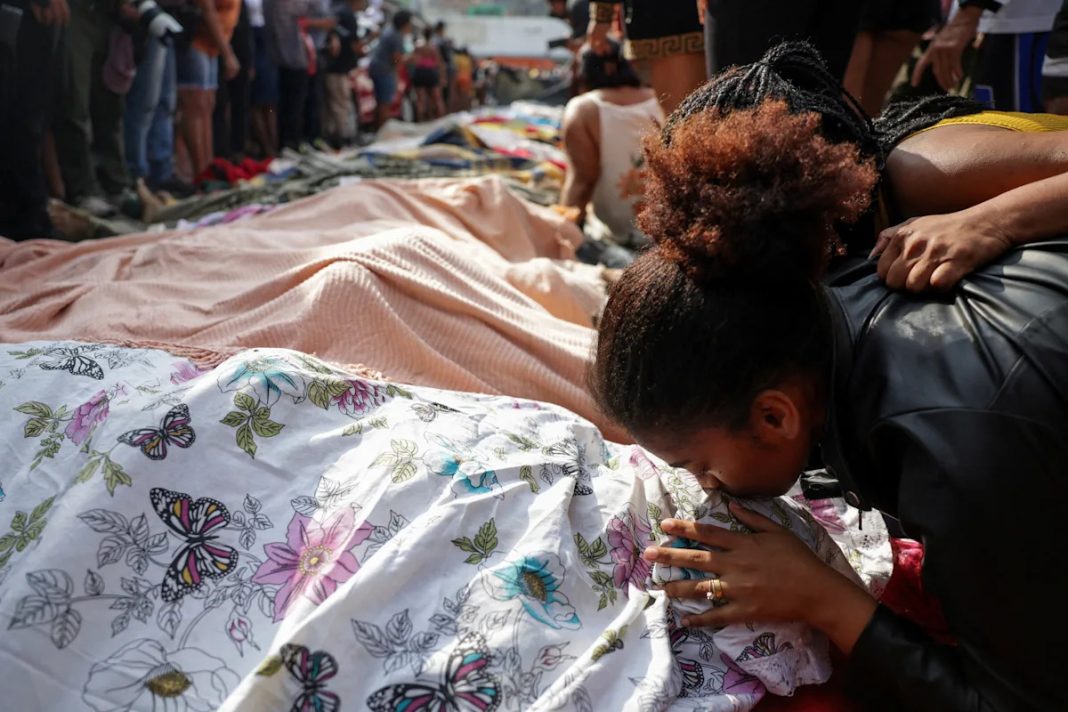A state police operation targeting a major drug gang in Brazil has resulted in the deaths of 132 people in low-income neighbourhoods in Rio de Janeiro – the deadliest raid in the country’s history.
Authorities initially said fewer than half that number had been killed in the favelas – the Portuguese term for slum. Protests against excessive police force have since broken out and activists are calling for Rio’s governor to resign over what local people have described as a “slaughter”.
State police said the operation carried out on Tuesday had been planned for months. The “sting” aimed to drive suspects into a forested hillside where special operation units were waiting to ambush them.
The following day, dozens of favela residents gathered in front of the state government headquarters shouting “assassins!” just hours after family members laid dozens of bodies out on a street in one of the targeted areas.
Among those expressing shock about the death toll was President Luiz Inacio Lula da Silva. According to Brazil’s justice minister, Lula was “astonished” that the federal government had not been informed about or asked to cooperate in the operation beforehand.
A sign reading ‘Claudio Castro (Rio de Janeiro governor) assassin and terrorist’ covers bodies of people killed in the anti-gang operation by police [Wagner Meier/Getty Images]
What happened?
Arriving on foot and in armoured cars, police launched a predawn raid targeting the Comando Vermelho (Red Command) gang, one of Brazil’s oldest criminal organisations, in Rio’s northern neighbourhoods of Penha Complex and Alemao Complex.
The gang, which originated in Rio’s prisons in the 1970s, has expanded in recent years and now commands territory across Brazil, including in the Amazon. Its criminal activities include drug trafficking, arms trafficking and protection racketeering.
Tuesday’s assault involved 2,500 police and soldiers. Many were waiting in wooded areas – where most of the killings occurred – close to the targeted sites. Red Command fired back at the government forces, sparking scenes of chaos across the two neighbourhoods.
Schools in the affected areas were closed, a local university cancelled its classes and several roads were blocked off. Elsewhere, many shops in the two districts closed on Wednesday.
What was seized, and how many people were killed?
Rio state Governor Claudio Castro, a far-right ally of former President Jair Bolsonaro, said forensic work was still under way. For now, he maintained, the official death toll was 58, including four police officers.
However, the public defender’s office, which provides legal assistance to the poor, reported that the figure was actually 132.
After the raid, the state government said 118 weapons and more than a tonne of drugs were seized. On Wednesday, Castro called the operation a “success”. He spoke in a video on X and called the raid a “historic day in the fight against crime in Rio de Janeiro”.
Supreme Court Justice Alexandre de Moraes ordered Castro to provide information about the police operation and scheduled a hearing with the governor and the heads of the military and civil police on Monday in Rio.
On Wednesday, residents in Penha gathered next to dozens of bodies laid out in a square, shouting “justice!” before forensic authorities arrived to retrieve the remains.
Rafael Soares, a Brazilian crime journalist, told the BBC that Red Command had been on the offensive in Rio de Janeiro in recent years, reclaiming territory it had lost to its main rival, First Capital Command.
Does Brazil have a history of violent police raids?
Police raids against criminal organisations are not uncommon in Brazil’s favelas and often turn deadly.
According to Soares, however, police operations in which more than 20 people die are “very rare” in Brazil. And most of those happen in Rio.
Before this, the city’s most deadly police raid occurred in 2021 when 29 people were killed in the Jacarezinho neighbourhood. In 2022 in another raid on the Alemao Complex involving 400 officers, helicopters and armoured vehicles, 19 people were killed.
And 111 prisoners were killed in Sao Paulo in 1992 when police stormed the Carandiru Penitentiary to quash a rebellion.
What is the government’s response?
On a visit to the state of Ceara on Tuesday, Justice Minister Ricardo Lewandowski called the raid “very bloody” and offered his condolences to the families of those “innocent people” killed. He said Lula was “horrified” by the scale of the fatalities.
But the government will also be monitoring how the public responds. National violence is a key issue before national elections next year. Nearly 50 percent of Brazilians think security has deteriorated under Lula, according to a survey by Parana Pesquisas, a national pollster.
On Wednesday, Lula took to social media to say that organised crime in Brazil “continues to destroy families, oppress residents, and spread drugs and violence across cities”.
The previous day, opposition lawmakers accused the president of protecting criminal groups. “The traffickers’ president must be upset. He lost voters in Rio,” Gilvan da Federal told Congress, referring to gang members killed in the Rio de Janeiro operation.
How have humanitarian organisations responded to the raid?
The brutality of this week’s raid has drawn criticism from Marta Hurtado, a spokesperson for the Office of the United Nations High Commissioner for Human Rights.
“We fully understand the challenges of having to deal with violent and well-organised groups such as Red Command,” she said.
But she also called on Brazil to “break this cycle of extreme brutality and ensure that law enforcement operations comply with international standards regarding the use of force”.
Cesar Munoz, director of Human Rights Watch in Brazil, called the deaths a “tragedy”. He added that “the succession of lethal operations that do not result in greater safety for the population but that in fact cause insecurity reveals the failure of the policies of Rio de Janeiro.”

